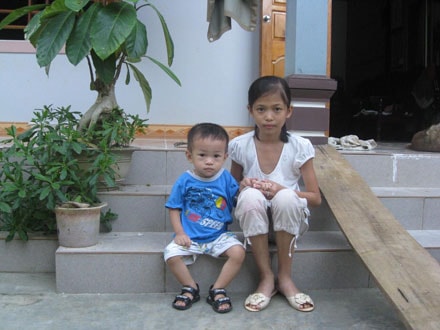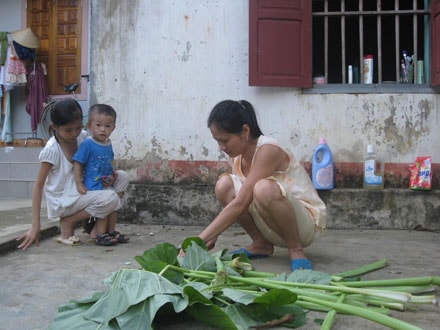The pain of a military family and the love of comrades
(Baonghean) -He is Thai, she is Kinh, both are soldiers working at the Military Command of Quy Hop District - Nghe An. They came together to build a home in the immense joy of both paternal and maternal sides, with the enthusiastic support of the whole unit. They were even happier when their two children, "both boys and girls", were born. However, misfortune struck this small family when both children were diagnosed with the terrible disease of cancer.
A family's pain
We visited the house of Vi Dinh Khuyen (born in 1971) and Nguyen Thi Oanh (born in 1976) in Con village, Chau Quang commune (Quy Hop), on an afternoon in late July, when the jungle rain had just passed. In the house built by her comrades and both families in 2009, Oanh was deep in thought as she talked about the misfortune that her family was facing day and night.
In 2000, they got married, and their joy was multiplied when in 2001, their first daughter, Vi Phuong Quynh, was born, eagerly awaited by both sides of the family. However, right from birth, Quynh was often sick, weak and pale. At first, the couple thought that their child had a normal digestive disorder, so they ran around looking for doctors and medicine to treat her. However, after using many different medicines, her condition did not improve. It was not until Quynh was 2 years old that the couple took her to Hanoi for examination that the doctor discovered that Quynh had hemolytic anemia (also known as blood cancer; or leukemia). This is a serious disease. In order to maintain life, the patient has no choice but to receive regular blood transfusions, otherwise, many other diseases will develop.

As soon as they learned of their child's illness, they had to take turns taking her to the Central Hematology and Blood Transfusion Hospital for a blood transfusion. Each trip lasted about 15 days, and the cost for each round trip was no less than 5 million VND. With regular blood transfusions, Quynh's health has improved, but this is not an easy disease to cure, so blood transfusions must be done periodically and over a long period of time, at least 15 to 20 years. Not only that, as Quynh grew older, her need for blood increased.
In early 2010, Ms. Oanh gave birth to her second child, Vi Dinh Tung. The joy of her family and relatives when a chubby baby boy was born was indescribable. However, after only 3 months, Tung also had the same symptoms as his sister, pale and weak. Linh felt something was wrong, so she and her husband took their child to the National Children's Hospital for examination. And it was heartbreaking when Tung also suffered from the same disease that his sister was carrying. Concerned because both children had the same fatal disease, Ms. Oanh was told by the doctor that the cause was genetic when both parents had blood type O, when giving birth, both children had blood type O, so the risk of gene mutation causing fatal diseases is often very high. To completely treat it, a bone marrow transplant is required, and the bone marrow must be taken from a sibling. However, both sisters are sick, and the cost for each such operation is up to more than 2 billion VND, a huge amount beyond the couple's reach. Therefore, now Mr. Khuyen and Ms. Oanh can only rely on blood transfusions and a miracle to maintain the lives of their two children.
One sick child requiring frequent blood transfusions had already caused hardship for the family, and now the second child was also sick, making the family even more destitute. With the couple’s meager military salary each month, it was not enough to cover the hospital fees and blood transfusions for their child.
...And the blood of comrades
During the years of treating their child, the couple could not always take their child for a blood transfusion in time, partly due to work conditions and the increasingly difficult family circumstances. Fortunately, during such times, Quynh and Tung received timely blood transfusions from many officers and soldiers with the same blood type O who were working at the Quy Hop District Military Command. Every time the children showed signs of paleness or illness, the comrades with blood type O volunteered to go to the district hospital to draw blood and transfuse it directly to the children.

Ms. Oanh also added that, fortunately, in difficult circumstances, they still had the support of their comrades and leaders in the unit, otherwise they would not have known how to manage on their own. When they learned that the children had a serious illness and needed regular blood transfusions, comrades in the Quy Hop Military Command volunteered to have their blood tested to transfuse to the children. Currently, there are 7 people with the same blood type as Quynh and Tung, ready to donate blood when needed.
Talking to us about the situation of Mr. Khuyen and Ms. Oanh, Lieutenant Colonel Le Dinh Cuong, Political Commissar of the Quy Hop District Military Command, said: In addition to organizing blood donations for the two children, with the difficult circumstances of the family, the District Military Command also advised the Party Committee and the Provincial Military Command to allocate 50 million VND from the Poor People's Fund to support the family to build a house for comrades. In 2010, the District Military Command allocated more than 7 million VND from the "Save yourself for the needy" movement to support the family.
When Ms. Oanh gave birth to Tung, according to the Labor Law, she had to go back to work after 4 months, but given the children's illness, the District Military Command also requested the Provincial Military Command to create conditions for Ms. Oanh to take care of and take the children to the hospital for treatment...
The noble acts of comradeship have become the motivation for Mr. Khuyen and Ms. Oanh's family to overcome difficulties in life. At the same time, the local blood source has helped reduce the pressure of having to promptly take their children to Hanoi. However, that is only a temporary solution, because here, although there is a source of blood available, the lack of necessary equipment makes the risk of the children contracting other diseases higher. Therefore, the couple still has to take their two children to Hanoi once a month for examination and blood transfusion. Ms. Oanh's family life is facing many difficulties in the immediate future, hoping that noble acts like the one of the Quy Hop District Military Command will be multiplied, to contribute to supporting her family in treating the children./.
Dang Nguyen






